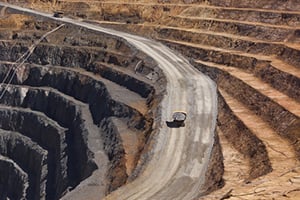
The Liberal, NDP and Conservative leaders are set to debate Canada's role in the world at an event put on by Munk Debates, an organization named after and financed by a wealthy businessman who made his fortune in mining. It will be interesting, therefore, to see if mining as a topic is given much, if any, attention by the leaders tonight.
Through his Aurea Foundation, Peter Munk, the founder of Barrick Gold, established Munk Debates in 2008. Peter's son Anthony Munk is part of the committee overseeing the debate series.
Peter Munk espouses strong political views. In the late 1990s he publicly praised Chilean dictator Augusto Pinochet at a Barrick meeting while a decade later he compared polarizing Venezuelan president Hugo Chávez to Hitler. In a March 2011 Globe and Mail interview, Munk played down criticism of Barrick's security force in Papua New Guinea by claiming "gang rape is a cultural habit" in that country.
The company Munk founded, like other Canadian mining companies, stands to gain or lose depending on Canadian foreign policy. For example, in 2011 the now defunct Canadian International Development Agency invested $500,000 in a World Vision Canada/Barrick Gold project. "In Peru," noted the aid agency, "CIDA is supporting World Vision Canada, in a program that will increase the income and standard of living of 1,000 families affected by mining operations." World Vision and Barrick combined to match CIDA's donation.
In response Miguel Palacin, the head of a Peruvian indigenous organization, sent a letter to World Vision, Barrick and CIDA claiming that "no 'social works' carried out with the mining companies can compensate for the damage done" by mining operations while the former co-ordinator of Common Frontiers Canada, Rick Arnold, described the NGO initiative as "a pacification program, and not a development project."
Barrick has also benefited from Canadian diplomatic support, including visits by the prime minister. In 2007 Stephen Harper met Barrick officials in Tanzania days after the company claimed a strike at one of its Tanzanian mines was illegal and looked to replace a thousand striking miners. Four months earlier Barrick gained important support for its Pascua-Lama operations, which spurred large-scale protests, during Harper's trip to Chile. He visited the company's Chilean office and said "Barrick follows Canadian standards of corporate social responsibility."
Will mining get its turn?
Barrick, which operates some of the most controversial mining projects in the world, has opposed moves to withhold diplomatic and financial support to Canadian companies found responsible for significant abuses abroad. In 2008, the Toronto-based company opposed the recommendations of a business/civil society mining roundtable launched by the previous Liberal government, and two years later the company lobbied against Liberal MP John McKay's private members bill C-300 (An Act Respecting Corporate Accountability for the Activities of Mining, Oil or Gas Corporations in Developing Countries).
Canadian-based companies dominate the international mining industry, operating in most countries around the world. In African and Latin American countries particularly, Canadian diplomats expend significant energy lobbying in favor of mining interests, aid dollars are channeled towards initiatives benefiting the sector, and officials in Ottawa seek to allay mining companies' fears by negotiating foreign investment promotion and protection agreements.
Canada's status as a global mining superpower ought to be part of a foreign policy debate. Let's hope tonight we voters are able to hear from the party leaders a serious discussion of regulating mining activities abroad or the appropriate level of government "aid" to profitable private companies. ![]()
Read more: Rights + Justice, Politics, Federal Politics, Election 2015














Tyee Commenting Guidelines
Comments that violate guidelines risk being deleted, and violations may result in a temporary or permanent user ban. Maintain the spirit of good conversation to stay in the discussion.
*Please note The Tyee is not a forum for spreading misinformation about COVID-19, denying its existence or minimizing its risk to public health.
Do:
Do not: